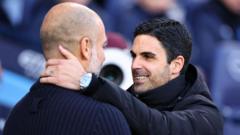Are Arsenal and Man City Reviving Long-Ball Football?

Published: 2025-09-21 05:25:20 | Category: sport
Both Arsenal and Manchester City are embracing a more direct approach in their playing style this season, shifting away from the traditional short-passing game. The introduction of new players and strategic changes highlight this evolution, which aims to exploit defensive vulnerabilities and enhance attacking opportunities. By utilising long goal-kicks and quick passing, these teams are adapting to the modern game's demands.
Last updated: 06 October 2023 (BST)
Key Takeaways
- Arsenal and Manchester City are increasingly using long goal-kicks as part of their attacking strategy.
- Both teams have signed players who thrive in a direct style of play.
- The shift towards direct play aims to exploit defensive weaknesses and create scoring opportunities.
- High pressing from opponents has led to a tactical evolution in how teams build from the back.
- Coaches are adapting their strategies to remain competitive in an ever-evolving football landscape.
Evolution of Tactical Styles in English Football
Traditionally, hoofing the ball upfield was associated with lower league teams, who often resorted to direct play due to a lack of technical finesse. However, in recent seasons, even top-tier clubs like Arsenal and Manchester City are embracing a more direct style. The arrival of players such as Noni Madueke and Viktor Gyokeres at Arsenal, alongside Manchester City's Gianluigi Donnarumma and Erling Haaland, suggests a significant tactical shift. This change prioritises quick transitions and effective counter-attacks over prolonged ball possession.
High Pressing and Its Impact on Tactical Decisions
The modern game has seen a marked increase in high pressing, which has significantly impacted how teams approach building from the back. The trend began to gain traction around the 2018-19 season, with many clubs adopting a coordinated pressing strategy. This high-pressure approach has forced opponents to play long passes, often leading to turnovers and increased chances for the pressing side.
According to Opta statistics, teams that frequently employed short passing last season often made more errors leading to opposition shots. In contrast, those who played longer passes experienced fewer errors, indicating a strategic shift in how teams are choosing to build their attacks.
The Role of Goalkeepers in Modern Tactics
Goalkeepers are no longer just shot-stoppers; they are vital components of a team's tactical setup. Arsenal's David Raya exemplifies this evolution. Despite Arsenal's dominance in possession, a surprising 42.1% of his passes last season were long. This strategic choice allows Arsenal to mitigate risks associated with building from the back while leveraging their players' strengths.
Raya's long kicks are often directed towards the right flank, with players like Kai Havertz moving into position to receive the ball. This tactic not only reduces the risk of losing possession but also positions Arsenal to press effectively should the ball go out of play.
Manchester City's Direct Play
Manchester City, under Pep Guardiola, has also adapted its style. While the team's long goal-kicks are often executed with attacking intent, they aim to isolate key players like Haaland. In a recent match against Spurs, City drew defenders in before launching a long ball, allowing Haaland to exploit space and engage in isolated duels.
This tactical nuance reduces the risk of conceding and enhances the likelihood of regaining possession. Players like Omar Marmoush are positioned to capitalise on second balls, creating further opportunities for goal-scoring. Guardiola's evolving philosophy, as he stated after a match against Wolves, reflects a desire to incorporate fast breaks into their play, balancing traditional possession with quick transitions.
Adapting to the Opposition
Both Arsenal and City have demonstrated an ability to adapt their strategies according to their opponents. While they often dominate possession, the capacity to switch to a direct style provides an element of unpredictability. Arsenal's new signings, like Madueke and Gyokeres, are particularly suited to this approach, showcasing their speed and ability to cover large distances.
In matches against teams like Nottingham Forest and Manchester United, Arsenal has noticeably accelerated their progression up the pitch. This tactical flexibility enables them to exploit spaces left by opponents who commit too many players forward. Conversely, in the match against Liverpool, Arsenal adopted a more defensive posture to mitigate Liverpool's counter-attacking threats, illustrating their adaptable game plan.
The Future of Tactical Approaches in the Premier League
The landscape of Premier League football is continuously evolving, with teams needing to adapt to the increasing quality of opposition. Both Arsenal and Manchester City are at the forefront of this tactical evolution, seeking to combine traditional possession play with a more direct approach.
As the season unfolds, it will be crucial for both teams to refine their strategies, particularly when facing teams that excel at pressing or defending deeply. The introduction of physically dominant players and tactical flexibility will be key in converting draws into wins, ensuring both teams remain competitive in the title race.
Conclusion
As football tactics continue to evolve, Arsenal and Manchester City are leading the charge towards a more direct style of play. By combining traditional possession with quick transitions, both teams are positioning themselves to exploit defensive weaknesses effectively. The changing landscape of the Premier League demands that top teams adapt, and this season's tactical shifts could prove pivotal in their quest for success.
How will other Premier League teams adapt to this emerging trend? Only time will tell. #FootballTactics #PremierLeague #ArsenalVsCity
FAQs
What is the significance of long goal-kicks in modern football?
Long goal-kicks allow teams to bypass opposition pressing, reduce risk, and exploit space in attacking areas. This tactic helps maintain possession and create scoring opportunities.
How do high pressing tactics affect game strategies?
High pressing forces teams to play long passes, which can lead to turnovers. It encourages teams to adapt their build-up play and focus on quick transitions to counteract pressing teams.
Why are goalkeepers now crucial to tactical play?
Goalkeepers are involved in build-up play, facilitating transitions and contributing to attacking strategies. Their ability to play long passes can change the dynamics of a game significantly.
What role do new signings play in a team's tactical evolution?
New signings can bring fresh attributes and skills that enhance a team's tactical approach. Players suited to direct play can increase a team's attacking options and adaptability.
How can teams balance possession and direct play?
Teams can balance possession and direct play by strategically choosing when to slow the game down or exploit transitional opportunities, depending on the opponent's strengths and weaknesses.



